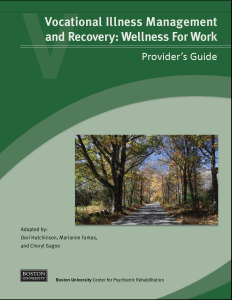Vocational Illness Management and Recovery
Dori Hutchinson, Marianne Farkas, and Cheryl Gagne

Curriculum / Workbook (PDF)
$64.97
Was: $129.95
Vocational Illness Management and Recovery
Dori Hutchinson, Marianne Farkas, and Cheryl Gagne
$64.97
Was: $129.95
Audience
Administrators, program managers, supervisors, practitioners, and peer support personnel may find the content of the Vocational Illness Management and Recovery curriculum useful in their work to support the vocational aspirations of people in recovery.
Additional Materials for Purchase
Description
The Vocational Illness Management and Recovery curriculum has three parts: Provider’s Guide, Participant Workbook, and Implementation Guide.
The Provider’s Guide is designed to provide you with the information, strategies, and tools for using Vocational Illness Management and Recovery (VIMR), a modification of the evidenced-based Illness Management and Recovery (IMR) curriculum that is oriented towards helping people with mental health conditions live well and thrive as they choose, get, and keep meaningful employment. It is a practical step-by-step guide for providers. The Provider’s Guide contains the values, principles, and key concepts that are the foundation of using VIMR, as well as a lesson plan for each of the nine modules of curriculum using jargon-free language, educational worksheets, and additional resources. This guide is meant to support providers to assist people who want to work to achieve wellness and employment.
The VIMR process teaches skills and strategies that have been shown to be helpful in alleviating distress caused by symptoms and work-related stress. The strategies in the Participant Workbook also can help you solve work relationship issues, handle stress better at work, improve your work-life balance, become more confident, and experience greater wellness. Further, these strategies can help you if you are struggling to maintain sobriety or to live and work without substances. The VIMR provides a structure that can help you make these changes so you achieve your work and recovery goals.
The Implementation Guide is designed as a supplement to the Vocational Illness Management and Recovery (VIMR): Wellness for Work Participant Workbook and to the VIMR Provider’s Guide. Administrators, program managers, and supervisors may find the content of this Implementation Guide useful in their work to support the vocational aspirations of people in recovery.
Citation: Hutchinson, D., Farkas, M. D., & Gagne, C. (2015). Vocational illness management and recovery. Boston, MA: Boston University, Center for Psychiatric Rehabilitation.
Product Details
Provider’s Guide:
PDF file: 49 pages
Published: 2015
ISBN: 978-1-878512-65-9
Participant Workbook:
PDF file: 261 pages
Published: 2015
ISBN: 978-1-878512-68-0
Implementation Guide:
PDF file: 66 pages
Published: 2015
ISBN: 978-1-878512-67-3
Table of Contents
Provider’s Guide
- Overview of Vocational Illness Management and Recovery
- Vocational Recovery and Wellness
- The Importance of Helping People Set Meaningful Goals
- The Core Values of Vocational Illness Management and Recovery
- Participants
- Logistics
- Using the Modules
- Overview of Strategies
- Cognitive-Behavioral Techniques
- Involvement of Significant Others
- The Content
- Format of the VIMR Sessions
- Goal Setting
- Developing Effective Practice Assignments
- Module 1: Recovery and Vocational Recovery
- Module 2: Practical Facts about Mental Health Conditions and Work
- Module 3: The Stress Vulnerability Model and Vocational Recovery
- Module 4: Using Medication Effectively and Avoiding Drugs and Alcohol for Vocational Success
- Module 5: Coping with Challenges and Symptoms at Work
- Module 6: Coping with Stress at Work
- Module 7: Building Social Relationships at Work
- Module 8: Preventing Relapses
- Module 9: Performing Your Best at Work
- Example: Goal Tracking Sheet
- Worksheet: Goal Tracking Sheet
- References
Participant Workbook
- Overview of Vocational Illness Management and Recovery
- Vocational Recovery and Wellness
- The Importance of Helping People Set Meaningful Goals
- Core Values of Vocational Illness Management and Recovery
- How Will This Workbook Help You?
- How to Use this Workbook
- References
- Module 1: Recovery and Vocational Recovery
- Module 2: Practical Facts about Mental Health Conditions and Work
- Module 3: The Stress Vulnerability Model and Vocational Recovery
- Module 4: Using Medication Effectively and Avoiding Drugs and Alcohol for Vocational Success
- Module 5: Coping with Challenges and Symptoms at Work
- Module 6: Coping with Stress at Work
- Module 7: Building Social Relationships at Work
- Module 8: Preventing Relapses
- Module 9: Performing Your Best at Work
Implementation Guide
- Introduction to the Implementation Guide
- Vocational Illness Management & Recovery: Wellness for Work: Concepts
- The VIMR Intervention and Provider Training
- For Administrators
- Introduction
- Organizational Self-Assessment
- Training Assessment Key
- Developing Training Readiness
- Incorporating VIMR into Organizations
- Some Common Questions about Implementation
- For Supervisors
- Introduction to VIMR Supervision
- Vocational Illness Management and Recovery Intervention Integrity Scale
- Tips for Supervisors
- Figures 1, 2, 3, and 4
- References
Authors
Reviews
Currently, there are no published reviews for this book. If you would like to write an endorsement, please send it to: cprbooks@bu.edu


